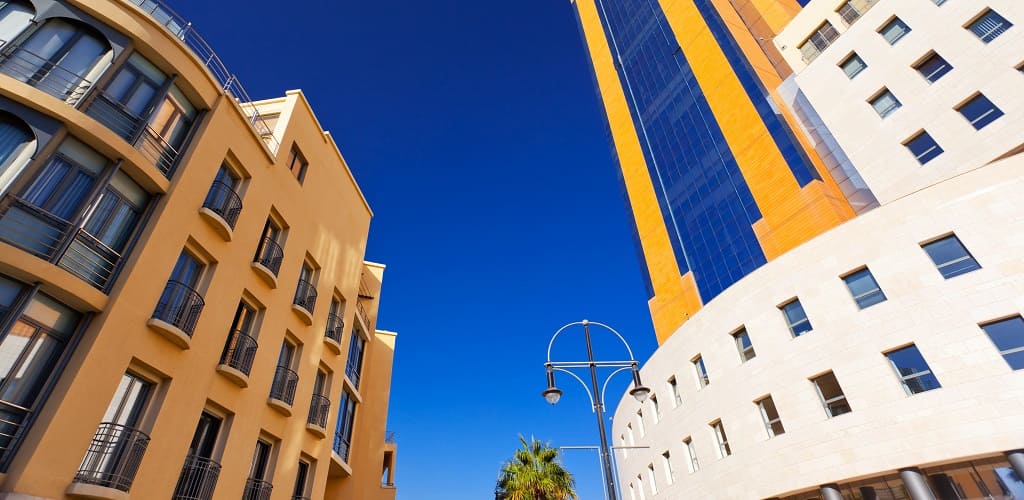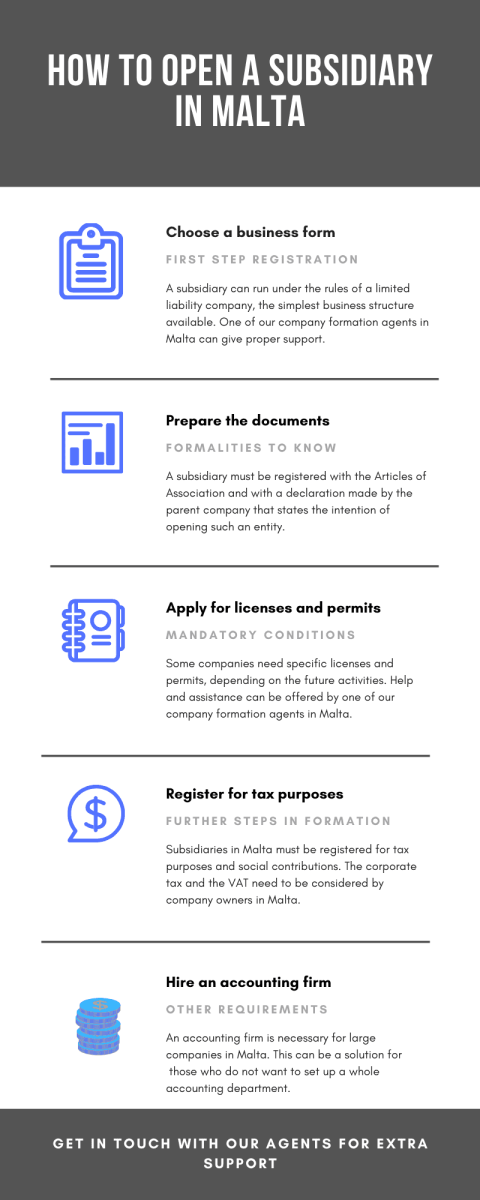A subsidiary is a legal entity chosen by foreign investors in Malta. The company abroad is separate from the operating company in Malta and the parent company can still control the subsidiary through the owned stock. Maltese subsidiaries benefit from the large number of double tax treaties signed with other states. An important treaty is also the EU Parent-Subsidiary Directive which allows for special provisions between the two related companies. These treaties regulate the minimization or cancellation of the withholding taxes on dividends, interests or royalties paid to companies in EU states or treaty countries. The taxes on profits are also subject of these treaties and they may be abolished or refunded in Malta based on their regulations. Our company formation agents in Malta are at your service if you would like to establish a subsidiary and they also can help you register any type of company in Malta.
| Quick Facts | |
|---|---|
| Applicable legislation (home country/foreign country) |
Maltese Company Law |
|
Best used for |
– banking, – insurance, – trading, – manufacturing, – ICT |
|
Minimum share capital |
Yes |
| Time frame for the incorporation (approx.) |
Between 9 and 11 weeks |
| Management (local/foreign) |
Local |
| Legal representative required |
No |
| Local bank account |
Yes |
| Independence from the parent company | Yes |
| Liability of the parent company | The subsidiary is liable for its debts and resposibilities. Owned stock can be controlled. |
| Corporate tax rate | 35% |
| Possibility of hiring local staff | Yes |
Facts about subsidiaries in Malta in 2024
The subsidiary is incorporated as a separate Maltese legal entity. This can be done in the form of a limited liability company, either public or private. The parent company abroad partially or totally owns the capital of the subsidiary. A private limited liability company formed in Malta must be incorporated by at least one founder and cannot have more than fifty shareholders. The minimum share capital must consist of at least 1,165 EUR, from which 20% must be paid up before registration. The management is assured by at least one director and at least one company secretary. Shareholders and directors can be local or foreign.
A public limited liability company is formed by at least two founders and it can have more than 50 shareholders. The minimum share capital is larger than for the private company, at 46,700 EUR, from which at least 25 % must be paid up prior to registration. At least two directors must assure the company’s management. This type of company is generally more suited for large businesses as it can be listed on the Stock Exchange and offer shares to the public. The main difference between a branch and a subsidiary in Malta is that the foreign company is not liable for the debts and obligations of the Maltese subsidiary. Please talk to our agents specialized in company formation in Malta for more information about how to set up a subsidiary in Malta in 2024.
Subsidiaries in Malta can be 100% foreign-owned, with full independence, and can also have other activities besides the main ones. The incorporation is made just like for any kind of company in Malta.
Here is an infographic with extra details:
The Memorandum of Association and the Articles of Association are required for opening a subsidiary in Malta. A legally representative company is needed at the time of incorporation.
Incorporating a subsidiary in Malta in 2024
In order to incorporate a subsidiary in Malta in 2024 the investor must observe the provisions of the Maltese Companies Act. Both types of limited liability companies are based on a Memorandum of Association that includes the most important information about the newly founded company:
- the name and registered office’s address;
- the type of company;
- the activities performed by the company;
- details regarding the shareholders;
- information regarding the amount of capital;
- the number of shares distributed to each shareholder and their rights;
- details regarding the company directors and secretary;
- period of availability (if any);
- the name and details of the company’s legal representative.
In addition, a bank account must be opened for a Maltese subsidiary, in order to deposit the minimum share capital. The desired name must be checked online and if it’s available, it must be reserved. The Memorandum of Association along with the decision of opening the subsidiary in Malta must be delivered to the Registrar of Companies which will issue a certificate of registration and a registration number.
The last step that must be taken before starting the commercial activities of the Maltese subsidiary is registering for social security and insurance for the company’s employees. Subsidiaries in Malta must observe the same principles for annual accounting and audit as any other company incorporated in the country. The foreign investors who want to open a subsidiary and move to Malta in 2024 or other foreign country can contact our immigration lawyers who can help them.
Only 20% of the minimum share capital for opening a subsidiary in Malta is needed at the time of incorporation. The deposit is made when the corporate bank account is opened in Malta.
We have also prepared a video presentation with information about subsidiaries in Malta:
Accounting requirements for subsidiaries in Malta
The national accountancy requirements for subsidiaries in Malta are overseen by the Maltese Institute of Accountants and by the Maltese Accountancy Board. Here is what you need to know about the accounting requirements for subsidiaries in Malta:
- first of all, the tax registration number needs to be obtained from the Inland Revenue Department;
- the registered office of the company keeps the accounting records;
- the VAT registration is mandatory for subsidiaries in Malta;
- the VAT returns for subsidiaries in Malta can be made on a quarterly basis.
A balance sheet, profits and loss account, a director’s report and an auditor’s report must reflect the true financial situation of the company. Our experts can help you with professional accounting services in Malta. If you do not want to establish an accounting department for your subsidiary in Malta, you can externalize such services and hire our accounting firm in Malta. Our team of experts is at your disposal if you are interested in accounting services for subsidiaries in Malta.
Is Malta implementing EU minimum corporate tax on subsidiaries?
Effective January 1, 2024, new EU rules have come into effect, introducing a minimum effective taxation rate of 15% for multinational companies operating in EU Member States. These rules, unanimously agreed upon by Member States in 2022, formalize the EU’s implementation of the Pillar 2 rules, as agreed upon in the global deal on international tax reform in 2021. The rules are applicable to any large group, both domestic and international, including the financial sector, with combined financial revenues of more than €750 million annually and with either a parent company or a subsidiary situated in an EU Member State.
Malta has opted not to immediately enact the recently established minimum tax rate for corporations as outlined by the OECD. This decision aligns with the EU regulations, which grant member states the flexibility to delay implementing the proposed 15% minimum tax for a period of up to six years. The regulations specifically target corporations with a global income surpassing €750 million. It is estimated that approximately 660 multinational companies operating in Malta will be impacted by this choice, affecting an estimated workforce of around 20,000 individuals. Given the provision for a six-year derogation period, Malta has deemed it economically prudent to defer the adoption of the new tax regulations for the forthcoming year. Notably, despite Malta’s standard corporate tax rate standing at 35%, the government extends a 6/7ths refund on tax obligations to foreign-owned entities within the country, further emphasizing its tax incentive policies.
The Maltese limited liability company – what you need to know
The company formation in Malta is made under the rules of Maltese Company Act. A subsidiary can run under the rules of private limited liability company which can be established by at least 2 shareholders, and which needs to have at least one manager and one company secretary. At least 20% of the minimum share capital of EUR 1,165 needs to be deposited in a Maltese bank account. It is good to know that there is no restriction involving the nationality of shareholders and managers, meaning that they can be local or from abroad. These are the rules for private limited liability companies in Malta.
As for public limited liability companies in Malta, these can be established in the same conditions, the only difference being related to the minimum share capital which is larger compared to the one for private limited liability companies. We remind that our company formation representatives in Malta are at your disposal if you would like to set up a subsidiary in Malta, so do not hesitate to solicit support for all the formalities involved in the incorporation process.
What are the differences between subsidiaries and branches in Malta?
A subsidiary is an independent structure, it is flexible and can be 100% foreign-owned. In the case of branches in Malta, this is completely dependent on the parent company, or in other words, it is an extension of the company from abroad. In terms of taxation, subsidiaries must register for taxation including VAT, while branches will have to obtain only the Maltese VAT number. Moreover, the taxation of subsidiaries is made on the global income, while branches are levied on the profits registered in Malta. You should respect the formalities of branches and subsidiaries in Malta and align with the requirements involved. Let our team of company formation agents in Malta tell you more about how you can set up a subsidiary or a branch in Malta.
Hiring staff for subsidiaries in Malta
Subsidiaries in Malta can be easily established and can benefit from the experienced workforce available in the country. This structure is flexible and foreign entrepreneurs can hire both local and overseas workers for their subsidiaries in Malta. There are no restrictions in this sense, however, it is recommended to pay attention to the visa and work permit requirements for citizens outside EU and EEA who want to work for your subsidiary in Malta.
Why start a business in Malta in 2024?
The advantageous business climate in Malta is appealing to a large number of international investors who want to generate profits in this part of Europe. The online gaming industry in Malta is extremely developed, it is supported by a permissive legislation and sustains the country’s GDP in a large percent. In terms of licenses and permits, the only companies which need to align with the requirements involved are the ones established in the financial sector.
Occupations like accountants, lawyers, opticians, etc. will have to observe the rules for special licenses and permits in Malta. This means that formalities of company registration in Malta have been simplified in the recent years, allowing entrepreneurs to set up their activities quite rapidly. Here are some facts and statistics about the business and economy in Malta:
- USD 231 million represented the total FDI stock for Malta in 2021;
- there are more than 30,000 companies registered in Malta, including foreign ones;
- the unemployment rate in Malta was set around 3.2% in 2022.
- the minimum wage in Malta is around EUR 777.
Subsidiaries in Malta can be established rapidly in 2024 if all the requirements and conditions are respected, in compliance with the applicable laws. For more information about how you can open a subsidiary, you may contact our local agents in company formation in Malta.



